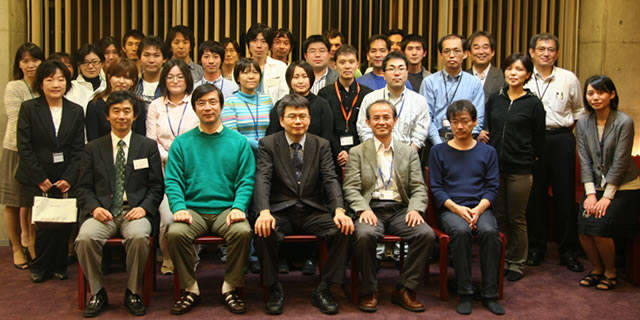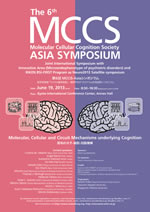FIRST EXPO 2014 in Shinjuku, Tokyo on February 28-March 1, 2014
All of the 30 FIRST Projects had a wrap-up exposition event namely “FIRST EXPO 2014”, in Nishi-Shinjuku on February 28 (Friday)-March 1 (Saturday), 2014. All the projects presented their research results in various types of sessions and exhibitions. Our Core Researcher Dr. Hideyuki Okano presented his research results on Saturday to the general public. Our project attracted attention to life science by explaining the importance on the genetically modified marmosets in the process to clarify the brain mechanism, which will pave the road for dealing with various mental disorders in the future. At our exhibition booth, we were able to show the visitors the research details and the results. It was the last exhibition in the 5 years that we were able to present our project all the way through, and we would like to express our sincere gratitude to our visitors who came by during the Expo. (The photos are taken before opening, as photo-taking was not permitted)
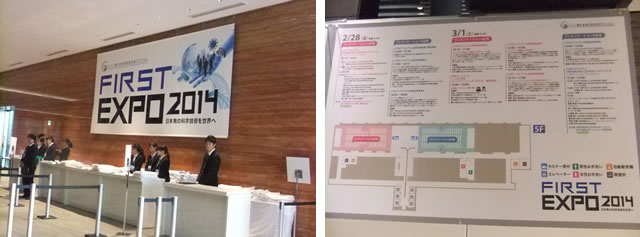
FIRST EXPO will be held on February 28-March 1, 2014
FIRST Program researchers will have a wrap-up exposition event namely “FIRST EXPO 2014”, in Nishi-Shinjuku on Friday-Saturday February 28-March 1, 2014.
All 30 projects will be lined up to present their research results in various types of sessions and exhibitions,
all of them are open to general public. Our Core Researcher Dr. Hideyuki Okano will also present his research result during the expo.
Separately, 2 “Business Matching Symposium” from the FIRST Program will also be held on January 22 in Sendai, and February 10 in Kyoto. The first one is concentrated on the field of electronic industry and the second one on the field of the leading-edge medical field.
You can see the details of all these three events on the JST website below:
Booth Exhibition in “ Science Agora 2013” in Odaiba, Tokyo, on November 9-10, 2013
On the weekend of November 9-10, we exhibited a project booth in the famous science festival “Science Agora” in Odaiba, Tokyo.
This is our second exhibit continued from last year, and we had almost double number of people visiting our booth compared with that of last year, approximately 100 people in 2 days.
As in last year, several researchers took turns in explaining our research as well as the perspectives now that it is only 5 months to wrap up the results. The weather was nice for a family visit to a scientific fair, and it brought us a good opportunity to learn how general public thought about our research.
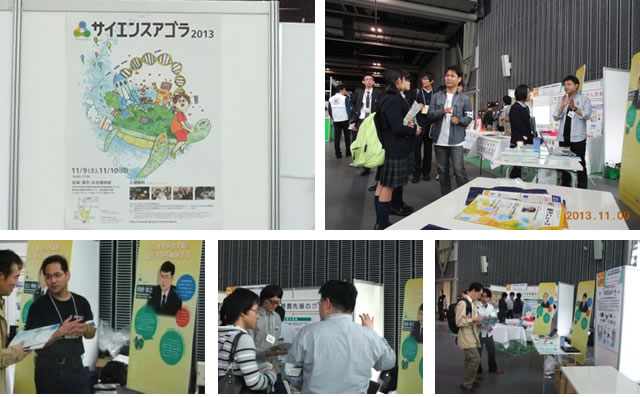
Fourth Progress Seminar for Okano ProjectJuly 30, 2013
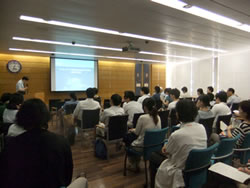
The fourth progress seminar for the “Strategic Exploitation of Neuro-Genetics for Emergence of the Mind” project was held on Tuesday, July 30 at Shinanomachi Campus of Keio University. We have only 8 months left toward the end of our project, and each team is about to achieve the result of their research. Our project advisor Dr. Mariko Hasegawa was delighted to see the progress each time she attends this progress seminar.
We will be summarizing the research result soon and wrap up the project on March 31, 2014.
Dr. Fred Gage visited RIKEN-Keio Univ. Joint Research LabJune 25, 2013
On June 25, 2013, Dr. Fred Gage from the Salk Institute, one of the world’s leading scientists in the field of neural stem cell research, visited RIKEN-Keio Univ. Joint Research Lab (the branch of Okano’s Lab) at RIKEN BSI, Saitama.
Drs. Okano and Kishi took him on a tour of the marmoset facility and discussed how the monkeys are used in brain science research.
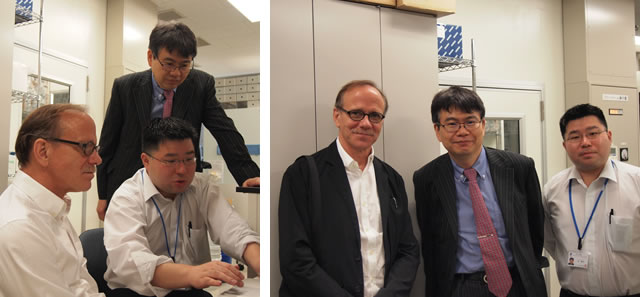
MCCS-Asia 6th Annual Meeting in Kyoto, JapanJune 19, 2013
The 6th annual MCCS-Asia meeting was held in Kyoto on June 19th, 2013, jointly with RIKEN BSI, FIRST program, and Innovative Area (Micro-endophenotypes of psychiatric disorders) of Grant-in-Aid for scientific research in Japan. The Molecular and Cellular Cognition Society (MCCS) is an international organization intended to facilitate interchanges among laboratories in the field of Molecular and Cellular Cognition. The other two key goals of the Society are to promote the study of the molecular and cellular basis of cognitive function, and to educate the general public on key findings in the field, including their limitations and implications for health and society. In this 6th Meeting, we recorded the biggest number of participants of 168, and we expect to have even bigger number in the next meeting. We are grateful for all the participants, speakers, and the staff who contributed to the organization of the meeting.
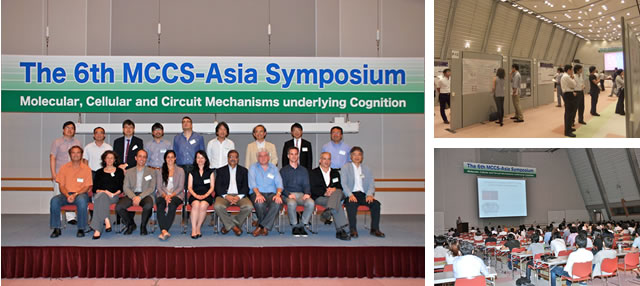
FIRST Program Special SeminarJune 17, 2013
We invited Dr. Angel Barco(Instituto de Neurosciencias, UMH-CSIC, Spain) to our FIRST Program Special Seminar on June 17, 2013. He dropped by RIKEN BSI before he attended MCCS-Asia Symposium and Neuro2013 in Kyoto.
Abstract:
Histone deacetylation in cognitive and neurodegenerative disorders:
A genomic perspective
The acetylation of histone tails is an epigenetic modification of the chromatin associated with active loci and thought to favor transcription. The process is regulated by the opposing activities of lysine acetyltransferase (KAT) and histone deacetylase (HDAC) enzymes and plays a relevant role in neuronal plasticity, learning and memory. This view is based on three independent lines of evidence. First, correlative evidence indicates that histone acetylation is dynamically regulated during memory formation. Second, the reduction of neuronal KAT activity has been associated with impaired intellectual abilities both in humans and mice, whereas reductions in specific HDACs have been associated with enhanced cognitive performance. Third, HDAC inhibitors (HDACi), drugs that increase histone acetylation, have been shown to potentiate memory and synaptic plasticity in wild type animals and to ameliorate cognitive deficits and neurodegeneration in animal models of different neurological conditions. However, the mechanisms that underlie the specificity and beneficial effects of HDACi in the nervous system remain largely unknown. We used chromatin immunoprecipitation coupled to deep sequencing (ChIPseq) and microarray technologies to investigate the relationship between histone acetylation levels and gene expression in the mouse hippocampus in the basal condition, in response to HDACi and in different mouse models of disease associated with reduced neuronal histone acetylation. The combination of differential expression and histone acetylation screenings clarified the role of histone acetylation in neuronal gene expression as well as the mechanism of action and main targets of HDACi in neural tissue. Both questions are of great interest for the development of new therapeutic strategies to treat neuropsychiatric disorders.

MCCS-Asia 6th Annual Meeting in Kyoto, Japan, June 19th 2013
A joint conference with RIKEN FIRST program and Innovative Area for Micro-endophenotypes of pyschiatric disorders.
The 6th annual MCCS-Asia meeting will be held in Kyoto on June 19th, 2013, jointly with RIKEN BSI (FIRST program) and Innovative Area (Micro-endophenotypes of psychiatric disorders) of Grant-in-Aid for scientific research in Japan.
There will be a symposium (from 8:50 to 18:15) including poster sessions (from 12:30 to 15:00) at the Kyoto International Conference Center, Annex Hall (http://www.icckyoto.or.jp/index.html).
Speakers:
Alcino J Silva (UCLA, USA), Cristina M Alberini (New York University, USA), Eric Klann (New York University, USA), Kaori Takehara-Nishiuchi (University of Toronto, Canada), Todd C Sacktor (SUNY Downstate Medical Center, USA), Moriel Zelikowsky (Caltech, USA), Angel Barco (CSIC, Portugal), Hideyuki Okano (Keio University, Japan), Thomas J McHugh (RIKEN BSI, Japan), Minoru Saitoe (Tokyo Metropolitan Institute of Medical Science, Japan), Satoshi Kida (Tokyo University of Agriculture, Japan), Jin-Hee Han (Seoul National University, South Korea), Minmin Luo (Tsinghua University, China),and Sumantra Chattarji (NCBS, India)
*To attend the meeting, registration is free but required; email information (name, title, institution) to micro@nodai.ac.jp.
*We also invite abstract submissions for poster presentations (Deadline May 31st, 2013). If you plan to present a poster, please send information (title of poster, author, institution) to micro@nodai.ac.jp.
Report on Science Festa in Kyoto2013. March 16, 2013
On the weekend of March 16-17, Science Festa 2013 was held in Kyoto. The event was organized by Cabinet Office and many other major organizations, institutes, and companies. The target is mainly general public and high school students. As in Science Agora in November, there were a lot of exhibitions and lecture talks. Our project panel was exhibited in the large exhibition area as before.On 17th, FIRST Science Forum 3 talk was also held in the same venue. The participants counted 5,957 in number for the 2 days.
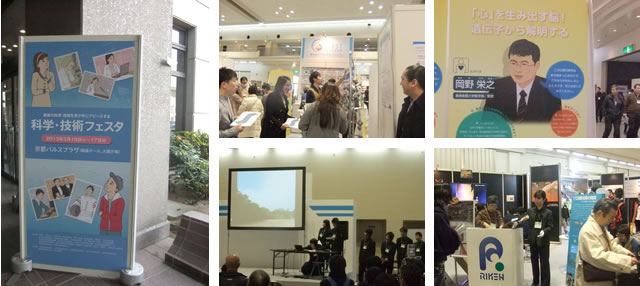
We exhibited a booth in “Science Forum 3” in Odaiba, Tokyo. November 10-11, 2012
On the weekend of November 10-11, Japan Science and Technology Agency (JST) held FIRST Science Forum3 in Odaiba, Tokyo. This year they added a booth exhibition area in which we participated alongside with the other FIRST researchers to explain about our research to students and general public in person. It was the first experience for us to stand in front of our poster and a project panel for outreach purposes. There was once a long queue in front of our booth and we wish we could try again next year. Please check out JST’s website for the latest news on the Science Forum 3 (http://www.jst.go.jp/first/) as they still have 2 more forums in January and in March.
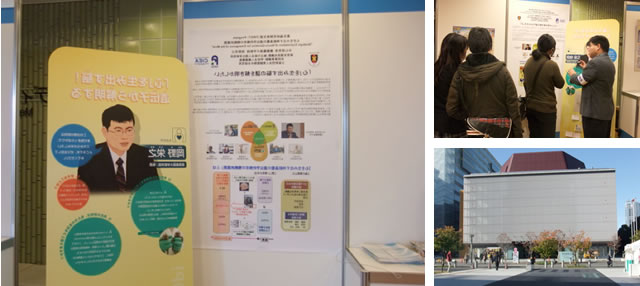
International Symposium APRU-BMAP2012/FIRST 2012
“Diseases and Evolution of the Brain and Mind” Aug.29-31, 2012
The international symposium, “Diseases and Evolution of Brain and the Mind” was held on August 29-31 2012 in Kitakan Hall at Keio University with the number of 240 audience convened for three days. The distinguished symposium was held under the auspices of APRU (Association of Pacific Rim Universities) as BMAP (Biennial Symposium on Brain and Mind Research in the Asia-Pacific).and concurrently co-organized by FIRST Program this time. The wide range of issues was covered during three days and three sessions were held as FIRST Program Sessions, namely ““Evolution of the Brain”,” Stress and its Consequence on the Mental Health,” and “Stem Cell Biology of the Nervous System and Disease Models”. Participants not only enjoyed listening to the renowned speakers from all over the world but also enjoyed participating in the panel discussion after each FIRST Program Session.
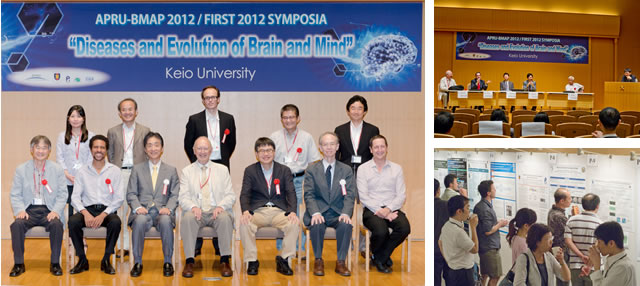
Third Progress Seminar for Okano Project on June 5, 2012
The third progress seminar for the “Strategic Exploitation of Neuro-Genetics for Emergence of the Mind” project was held on Tuesday, June 5 at Shinanomachi Campus of Keio University.
The last time we assembled about one year ago, introductory speeches were given by new researcher Dr. Toshiaki Noce, who started this April at KEIO-RIKEN Research Centre for Human Cognition, and Dr. Yasubumi Sakakibara of Keio University Faculty of Science and Technology. This time we added Drs. Tomomi Shimogori and Manabu Tanifuji to our RIKEN BSI research collaborators and were able to see the new phaze in our project.
Our project advisor Dr. Mariko Hasegawa attended the meeting and encouraged us toward the research goals. Professor Okano emphasized that it is the time for everyone to consolidate the research results in a significant way.
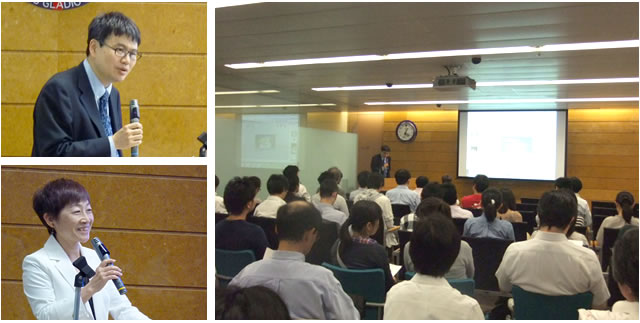
FIRST Program Special Seminar
On March 19, we held FIRST Program Special Seminar at RIKEN BSI, where we invited Dr. Simon E. Fisher, Director, Max Planck Institute for Psycholinguistics in Nijmengen, the Netherlands.
Lecture Title:Neurogenetic pathways implicated in speech and language disorders
Over 60 people participated in the seminar and his lecture illustrated how FOXP2 can provide a unique molecular window allowing us to bridge gaps between genes, brains, speech and language.
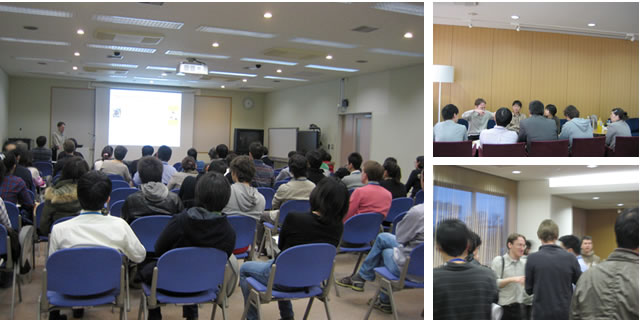
International Symposium “Neural Development: Stem Cell Perspective” on January 17-18, 2012
The international symposium, “Neural Development: Stem Cell Perspective” was held on 17 and 18 January 2012 in Kitakan Hall at Keio University with the number of 265 audience convened for two days. Jointly organized by the RIKEN Brain Science Institute and the British Embassy Tokyo, the symposium was co-organized by Erika Sasaki (Central Institute for Experimental Animals) and Hideyuki Okano( Keio University School of Medicine ).It included lectures given by 15 distinguished researchers in neuroscience, stem cell biology, and developmental biology. The two main areas addressed were (1) pluripotent stem cells: embryonic stem cells and iPS cells and the production of genetically modified animals; and (2) neural stem cells: outer sub-ventricular zone progenitors contributing to the enlargement of the cerebral cortex. The lectures were followed by lively group discussions on these timely and important topics in biology, and FIRST researchers had the opportunity to discuss their research with the invited speakers and initiate new collaborations. The success of this symposium further advances the progress of FIRST as a leading program in cutting-edge research in Japan.
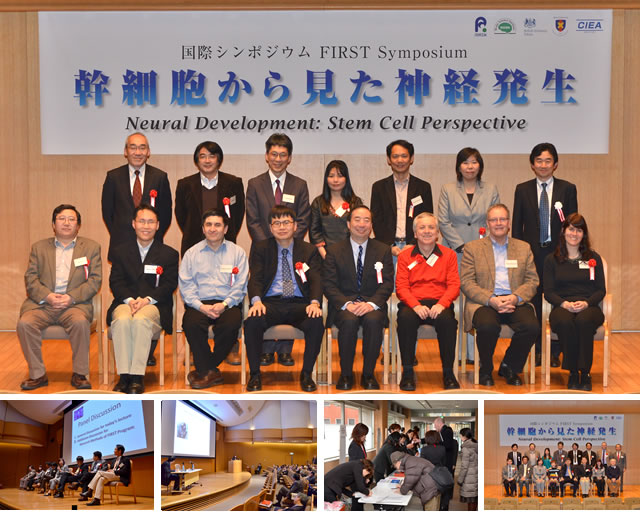
International Symposium "Neural Development: Stem Cell Perspective"
International Symposium "Neural Development: Stem Cell Perspective" will be held on Tuesday-Wednesday, January 17-18,2012.
| Registration : | Registration opens early December at: http://www.bsi.riken.jp/jp/event/StemCell/ |
|---|---|
| PDF(1.3MB) : | 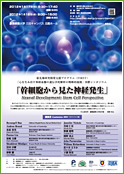 |
Second Progress Seminar for Okano Project on July 6, 2011
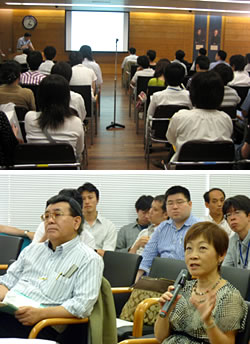 The second progress seminar for the "Strategic Exploitation of Neuro-Genetics for Emergence of the Mind" project was held on Wednesday, July 6 at the Shinanomachi Campus of Keio University.
The second progress seminar for the "Strategic Exploitation of Neuro-Genetics for Emergence of the Mind" project was held on Wednesday, July 6 at the Shinanomachi Campus of Keio University.
It provided a second opportunity for all the sub-theme leaders to report on the progress of their research since the kick-off seminar on September 30 last year.
There were 67 participants this time, including researchers involved in the project. Introductory speeches were given by new researcher Dr. Toshiaki Noce, who started this April at KEIO-RIKEN Research Centre for Human Cognition, and Dr. Yasubumi Sakakibara of Keio University Faculty of Science and Technology. Our project advisors, Dr. Takashi Gojobori and Dr. Mariko Hasegawa, spent the day with us, kindly giving us precise comments and constructive advice.
The day was a moment to celebrate the progress we had made in the previous six months, although we still have a long road ahead as we reach toward our research goals.
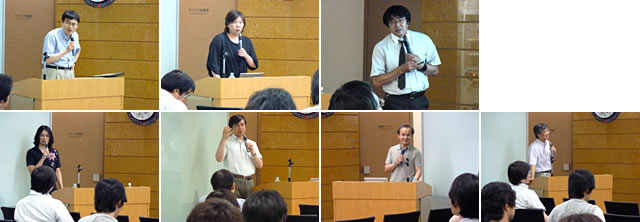
"TOP OF THE TOP! - 30 Researchers Aiming for the Top of the World" Exhibition
Special Exhibition is scheduled at Miraikan, Tokyo during June 11(Sat) -July 24(Sun).
"TOP OF THE TOP! - 30 Researchers Aiming for the Top of the World" Exhibition
| Term : | June 11 (Sat.) - July 24 (Sun.), 2011 |
|---|---|
| Venue : | 3F Science Library at Miraikan, Tokyo http://www.miraikan.jst.go.jp/en/guide/route/ |
| Admission Fee : | Free (Fees will differ depending on the exhibition in other areas of Miraikan) |
Through 30 panels, this exhibition introduces the 30 world-class researchers in Japan chosen to participate in the FIRST Program (Funding Program for World-Leading Innovative R&D on Science and Technology).
Professor Hideyuki Okano's panel will be exhibited through this period.
FIRST SCIENCE FORUM, Future Exploration by "Top Scientists and Students" on February 13, 2011
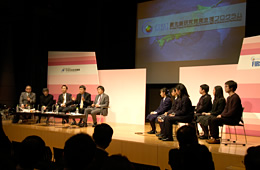 On Sunday, February 13, 2011, FIRST Science Forum, sponsored by the Japan Science and Technology Agency (JST) was held. The Forum is targeted mainly to high school students and the general public. The seminar was titled "WONDER: Science starts with what you see around you!" and had 4 renowned scientists as lecturers. Professor Hideyuki Okano was one of them (see http://www.jst.go.jp/first/forum/forum-1st.html; Japanese only). The forum, planned for outreach purposes by JST, consisted of four sessions in February and March with venues in Tokyo, Kyoto and Osaka.
On Sunday, February 13, 2011, FIRST Science Forum, sponsored by the Japan Science and Technology Agency (JST) was held. The Forum is targeted mainly to high school students and the general public. The seminar was titled "WONDER: Science starts with what you see around you!" and had 4 renowned scientists as lecturers. Professor Hideyuki Okano was one of them (see http://www.jst.go.jp/first/forum/forum-1st.html; Japanese only). The forum, planned for outreach purposes by JST, consisted of four sessions in February and March with venues in Tokyo, Kyoto and Osaka.
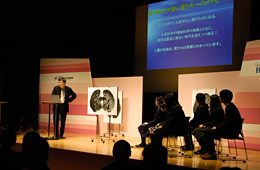
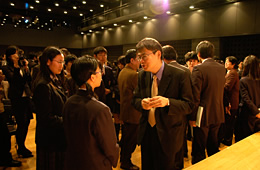
The first part introduced the scientists and the contents of their research, and was followed by an interactive session in which discussion were held between the scientists and several high school students. After the session, there was time for students to ask questions individually as the scientists came down off the stage, for an "after-talk." The allotted time for the talk was apparently too short as they went overtime until the hall had to be vacated. News about the event was aired on NHK that evening. Some students who had a chance to speak proudly posted their comments on their high school websites, which made the forum more exciting.
The youth enjoyed talking to famous scientists and were inspired by hearing them talk about their dreams.
Professor Okano sent this hearty message to the participants: "The future of humanity is on your shoulders. Good Luck!"
International Symposium "Biology of Mind"-Toward a Human Evolutionary Perspective on February 3, 2011
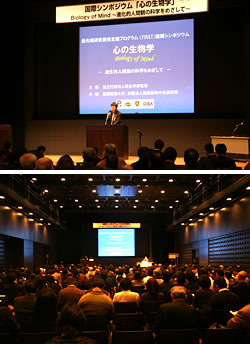 Our first international symposium "Biology of Mind"-Toward a Human Evolutionary Perspective-was held on Thursday, February 3 at Marunouchi Bldg Hall in Tokyo.
Our first international symposium "Biology of Mind"-Toward a Human Evolutionary Perspective-was held on Thursday, February 3 at Marunouchi Bldg Hall in Tokyo.
Hideyuki Okano is the lead researcher for a cutting-edge brain science research project focusing on mechanisms underlying the evolution of the mind and the emotions. The project has attracted significant attention among the 30 FIRST projects currently underway as it goes well beyond basic and applies science, exploring areas traditionally reserved for the humanities and social sciences.
The symposium included lectures and discussions by 14 distinguished researchers in neuroscience as well as law and religion, and proved a fitting event for the launching of the Okano project with its far-reaching objectives.
The following day on Friday, February 4 was the day for the more specialized seminar, FIRST Program Special Seminar inviting three lecturers from abroad who were with us the previous day. We had nearly 90 audiences who were eager to know about more in their research fields.
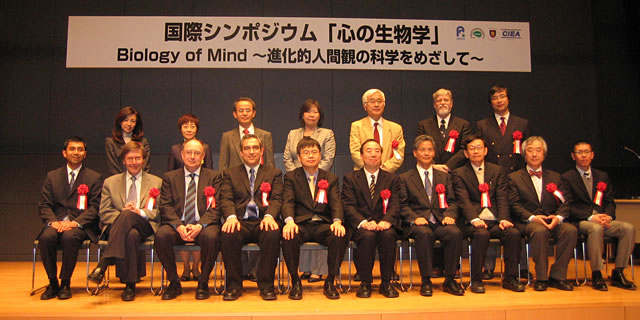
Through these two days, we focused from an academic perspective on what it is that makes us human, an area of inquiry that we are only just beginning to explore. By continuing to pursue this kind of collaboration with the humanities and social sciences, we hope to open up new avenues of thought and stimulate new discussions.
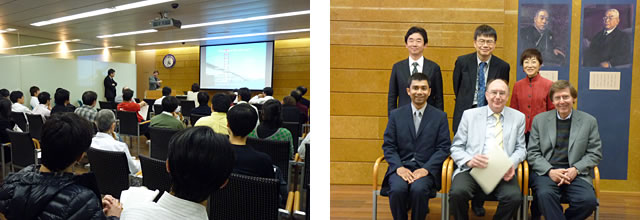
The FIRST kick-off seminar for Okano Project on September 30, 2010
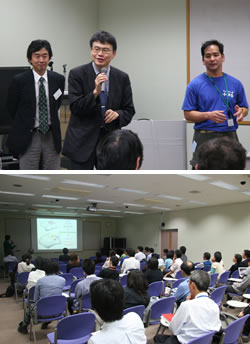 The first kick-off seminar for our project, "Strategic Exploitation of Neuro-Genetics for Emergence of the Mind," was held on September 30 at the RIKEN Brain Science Institute.
The first kick-off seminar for our project, "Strategic Exploitation of Neuro-Genetics for Emergence of the Mind," was held on September 30 at the RIKEN Brain Science Institute.
In preparation for the project, Professor Okano, the core researcher, and the sub-project members have been busy holding discussions and intensive meetings with each other. This seminar gave us an opportunity to meet with researchers in related disciplines and to engage in active discussion and an exchange of ideas.
The seminar had 46 participants in total and started with Professor Okano's presentation giving an outline of the project, followed by presentations from sub-project researchers describing their themes and the current status of their research. The meeting served as a forum to give all participants a comprehensive view of the entire project, and a chance for them to exchange views with their colleagues.
